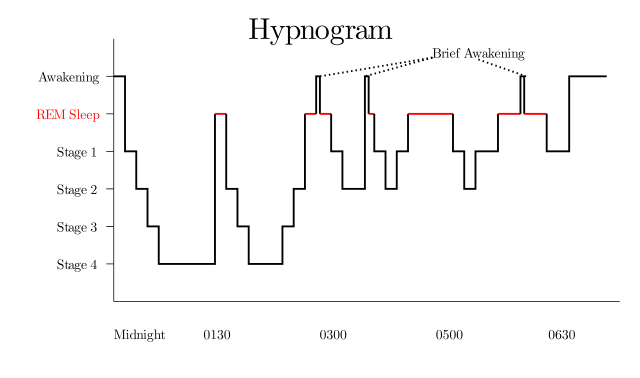Drawing Deep From the REM Well
Episode #3 of the course Sleep hacks: Using science to improve your sleep by John Robin
Welcome to Day 3 of our course!
Yesterday, we saw just what sleep is and why we should commit to spending ⅓ of our lives in bed, but we left one important part of that for today: REM.
Aside from also being the name of a great rock band, REM is key to understanding why just getting the first four to six hours of critical sleep is not enough.
Why REM-ming Is Your Brain’s Superpower
You’ll recall from yesterday that dreaming sometimes occurs in the deepest stage of sleep, Stage 3 non-REM, also known as slow-wave sleep. However, during REM, it is most common, as this is the stage where the brain is most active.
We also saw yesterday that during each sleep cycle, we first skip over REM as we proceed down to the deepest unconscious states, then ascend back up to REM, staying there before awakening.
You can see that in this diagram:

You can also see how as the night proceeds, you spend less time in the deeper stages (some clinicians split Stage 3 into Stages 3 and 4, as in this diagram). You’ll also see how you spend a long time in the REM stage with later cycles.
What happens during REM that makes it so important?
You can think of the deeper stages of sleep for healing in the body, such as restoring fatigued muscles and repairing other stressed or damaged cells. In REM, the healing moves to the brain itself.
Think about what happens in your brain on a typical day.
How many times do you have thoughts? Feel emotions? Experience sensations? Make decisions? Recall memories? Even reading this lesson today and what you’re learning is using your brain’s fuel—thousands of brain cells are firing just as you process this paragraph.
For every activity in your brain, chemical reactions occur at structures called synapses, which join neurons together. These chemicals, called neurotransmitters, are involved in sending signals. Common ones are dopamine, epinephrine, norepinephrine, serotonin, and GABBA (which stands for gamma-aminobutyric acid). Each time these neurotransmitters are used to communicate from one neuron to another, they break down into waste products.
In a day, there are many of these waste products left behind in the brain.
When REM sleep starts, the cleanup crew moves in.
Studies on REM deprivation have strongly suggested that not getting a full night’s sleep leads to irritability, hallucinations, increase in appetite, and problems with attention. On the other hand, those who get their full REM zzzs are alert, make better choices, learn more efficiently, and have better coordination.
In short, REM-ming is your brain’s superpower.
It’s natural to conclude that whatever is happening in REM sleep, it’s related to optimizing our brain for another day. Drawing deeply from the REM well is equipping yourself for:
• better mood
• better concentration
• stronger immune system
• better appetite control
• improved learning
• better decision-making
And that’s all without any caffeine!
How do you know when you’ve had exactly enough REM sleep?
The simplest strategy is to never wake up to an alarm. Stay in bed until you wake up feeling unable to sleep anymore. Unless you ran a marathon the previous day, this shouldn’t be longer than ten hours and will most likely be between eight to nine hours. If that sounds impossible, hold on, we’ll be covering how to do this later in the course!
The amount of sleep you need will also vary every night. Why? Because every day, you accumulate different levels of waste products in your brain and body, so the exact work your body needs to do to get fully restored for another day will depend on how much cleanup is necessary.
It also depends on how efficient the cleanup is: If you consume stimulants like coffee or energy drinks, you won’t sleep as deeply, which will mean more time in bed to get the same quality of sleep without them.
The main hack to your sleep is this: Draw deep on the REM well if you want to get the benefits of better concentration, better mood, better learning, and better decision making.
It might seem like a waste of time to stay in bed that extra one to two hours, but I can say from my own experience that since I started forcing myself to sleep fully, equipped with this knowledge about REM and its critical importance, my attention has become razor sharp. I can accomplish four to five hours of work in what it used to take me eight to ten hours to achieve, and I feel great all day.
Yet, this leads us to a natural question: What happens if you can’t get eight to nine hours in bed every night? Is there still a way to get that missing REM through other sleep strategies?
That will be tomorrow’s topic!
Recommended book
Sleep Smarter by Shawn Stevenson
Share with friends

